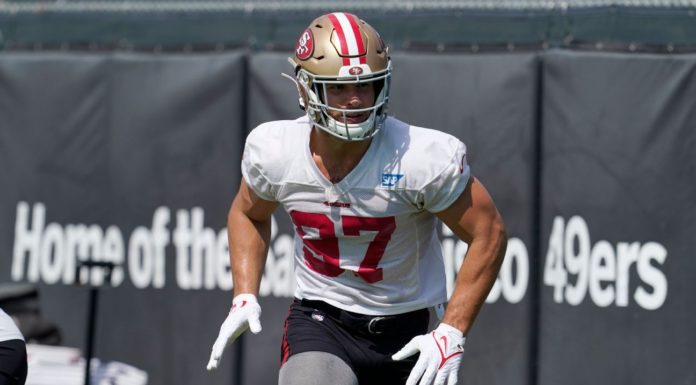Now Playing
Watch Netflix’s When They See Us: Limited Series Teaser Trailer

Next Up
The 100 Sneak Peek: Russell and Simone Discuss the Children of Gabriel
Back in March, Ava DuVernay announced that she renamed her four-part limited series about the Central Park jogger case. What was originally known as Central Park 5 would instead be released with the new title, When They See Us. The change was welcome and better speaks to the series’ intentions. “Central Park Five” was the moniker given to the five teenage boys — four black, one Hispanic — who were wrongfully convicted and imprisoned of the crime. The name was often used pejoratively, conjuring up mental images of a threatening, violent gang as a way to strip the boys of their innocence. But in DuVernay’s retelling, in which she directs and co-writes each episode, the Oscar-nominated filmmaker zeroes in on how people of color are quickly judged at first sight, and is intent on making viewers really see these boys. They were teenagers with friends, families, hopes, and plans — entire lives that ceased when their freedom was ripped away from them.
When They See Us jumps in almost immediately: April 19, 1989, the night a white jogger, Trisha Meil, was found assaulted and raped in Central Park — and the same night a number of teenagers were arrested there for “unlawful assembly.” These opening scenes are frenzied, disorienting, and hard to follow, which adds to the series’ urgency. It’s an interesting choice to start the action straight away rather than spending much time introducing and characterizing the boys (though there is a little), but it’s one that works. DuVernay could have provided the emotional narrative of setting up these kids as “good” kids in hopes that the audience will sympathize with them more but by eschewing this, she rebukes the idea that black and brown kids have to be “angels” in order for us to care when something happens to them; it’s a reminder of the harmful trope of the “good immigrant.”
Here’s What’s New on Netflix in May
The majority of the first episode is spent on the interrogation of the main five: 14-year-old Raymond (Marquis Rodriguez) and Kevin (Asante Blackk), 15-year-old Yusef (Ethan Herisse) and Antron (Caleel Harris), and 16-year-old Korey (Moonlight‘s Jharrell Jerome). Essentially led by Manhattan Prosecutor Linda Fairstein (Felicity Huffman, a casting choice that is now very amusing), it’s clear everyone has already made up their minds about who the criminals are. DuVernay’s directing, combined with Bradford Young’s brilliant cinematography makes for chaotic, claustrophobic scenes which are very on the nose, but do give viewers a near-tangible sense of fear while watching. Much of When They See Us feels decidedly unsubtle: the police brutality during the interrogation, the repeated use of words like “rampage” or “animals,” the fudging of timeline and details to try and reverse engineer the narrative the detectives want, the coaching to get the right answers, and so on. But the overtness is used to really hammer home the detectives’ abuse of power, the children’s innocence and confusion (when asked, “What do you know about rape?” a seventh grader responds, “It’s, uh, something about sex?”), and the unfortunate naiveté of guardians and family members who are just trying to stop the person they love from getting locked up. (Also unsubtle, but necessary, is the Donald Trump of it all, who notoriously spent a reported $85 million on ads calling for the death penalty and continued to assert their guilt even after the convictions were vacated.)
 Asante Blackk, When They See Us
Asante Blackk, When They See Us
When They See Us doesn’t fit with the wave of true crime series. It’s not built around the sensational or aiming to get inside the mind of a criminal. It’s not even designed to be marathoned in one sitting. It’s a hard and sometimes overwhelming watch, and the episodes could certainly be shorter and tighter — once in a while, it feels a bit unfocused because there’s just so much DuVernay and co. want to say — I frequently took breaks because of how much my body was tensing up. It’s a retelling that packs an emotional punch by focusing on what these five boys — and later young men — lost by being in the wrong place at the wrong time. It’s a heartbreaking look at racism and prejudice, of the abuse of power, and of the penal system. (It’s a good companion piece to DuVernay’s The 13th, also on Netflix.)
When They See Us also touches on the family and friends who felt the ripple effects: when Kevin’s sister Angie (Kylie Bunbury) visits him in prison, she dreamily tells him about the crush she met at work … and how she turned him down for a date. “I didn’t think I should be having fun, in romance or whatever, while you’re in here,” she says. This guilt — of being outside when a family member is in, of not knowing how to handle cops at the precinct, of unknowingly giving someone the wrong advice — runs throughout the series, also seen in a brilliant performance by Michael K. Williams as Antron’s father.
 Ethan Herisse and Marquis Rodriguez, When They See Us
Ethan Herisse and Marquis Rodriguez, When They See Us
After the second hour, which is devoted to the trial, the third episode skips ahead to the boys as adults (played by Jovan Adepo, Chris Chalk, Freddy Miyares, and Justin Cunningham; Jerome, as Korey, is the only actor who plays his character throughout). It’s here that When They See Us picks up, taking place during the between years of conviction and vacated judgment, a time period that hasn’t really been documented. The men struggle to adjust to life outside, attempting to get jobs that work around their probation curfews and the rules of being a registered sex offender. In one small detail, newly-released Raymond can’t seem to shake prison habits: he showers with his underwear still on.
But it’s the final episode — which clocks in at almost 90 minutes — that is the most harrowing, the one that’ll stick with you long after you’re done watching. It tracks Korey, the only one of the group to be tried and convicted as an adult rather than a minor, through his years spent in various prisons. Jharrell Jerome’s performance is powerful and unforgettable, a true stand-out in a show full of fantastic actors (Niecy Nash, John Leguizamo, Dascha Polanco, and more). We see him as a scared 16-year-old amongst adult men in Rikers, beaten by white supremacists (and others), losing his sense of time and self in solitary while being haunted by his past choices and fantasizing about “what if?”
When They See Us isn’t a perfect series — sometimes it can feel too heavy-handed or veers into repetition as if it’s more akin to an educational tool, and those wanting to see more backstories of prosecutors are lawyers aren’t going to get that here. But it’s certainly a necessary and poignant series. There is no way to hand back the time lost to these five men, but at the very least, DuVernay has made sure that we’ll all finally see them.
When They See Us streams Friday, May 31 on Netflix.
Source : TVGuide








